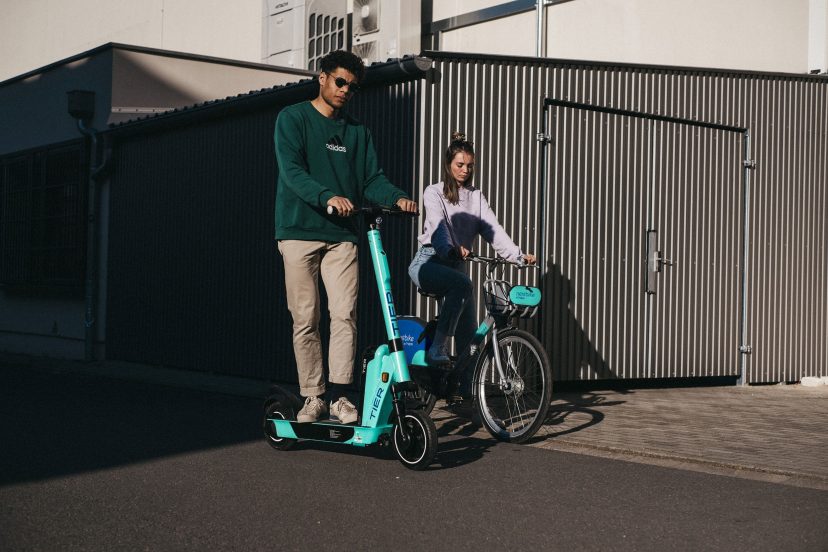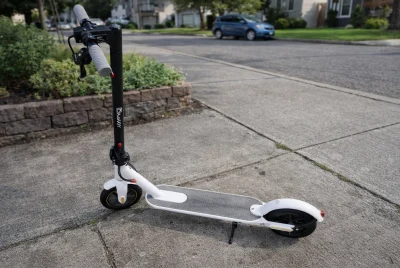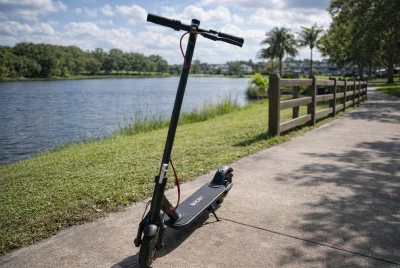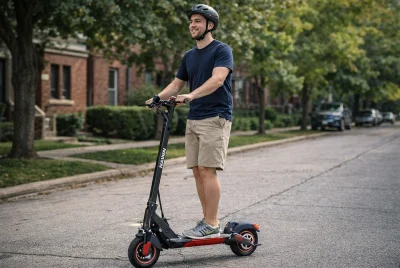Electric Bikes vs Electric Scooters
*We may earn a commission for purchases made using our links. Please see our disclosure to learn more.
As an enthusiast and advisor in the world of electric mobility, I often get asked: “What should I choose, electric bikes vs electric scooters?” Let’s explore both options to help you make an informed decision.
Understanding Electric Bikes
Electric bikes, also known as e-bikes, have gained immense popularity in recent years, and for good reason. They offer a balanced blend of pedal power and electric assist, providing a great way to keep fit while also saving energy on longer rides or uphill climbs. The electric motor in an e-bike kicks in when you start pedaling or when you need an extra boost, making it easier to tackle steep inclines and challenging terrains. This feature is particularly appealing to commuters who may face hilly landscapes on their daily journeys.
E-bikes also have an edge in terms of speed and power, often capable of higher top speeds than electric scooters. This makes them ideal for longer commutes, especially for those who need to cover more significant distances to reach their destinations. Additionally, they usually come with better suspension systems, providing a smoother ride on rougher terrain, ensuring a comfortable and enjoyable experience for the rider.
The Pros of Electric Bikes
- Health Benefits: Electric bikes encourage physical activity, as riders still need to pedal, albeit with assistance. Commuting on an e-bike can become a part of your daily exercise routine, helping you stay fit and active.
- Efficiency and Energy Savings: With the electric motor providing assistance, e-bikes are more energy-efficient than traditional bicycles, especially when tackling challenging routes. This translates to reduced energy consumption and lower environmental impact.
- Longer Range: Electric bikes generally have larger batteries, which gives them a longer range than most electric scooters. This extended range is advantageous for those with lengthy commutes or who plan to use the bike for recreational purposes.
- Speed and Power: E-bikes offer higher top speeds and more power, making them better suited for longer commutes and riders who seek a quicker mode of transportation.
The Cons of Electric Bikes
- Cost: On the downside, e-bikes tend to be more expensive than electric scooters. The technology and components used in electric bikes, including the battery and motor, contribute to their higher price point.
- Size and Weight: Electric bikes are generally larger and heavier than electric scooters, making them less portable and more challenging to store, especially for city dwellers with limited space.
- Maintenance: Electric bikes require regular maintenance, particularly for their electric components. While they are built to withstand wear and tear, occasional maintenance and battery replacements are essential to keep them running optimally.
Understanding Electric Scooters
Electric scooters have become a ubiquitous sight in many cities worldwide, offering a convenient and eco-friendly mode of transportation. They are designed for simplicity and portability, making them a popular choice for urban commuting and short-distance trips. Most electric scooters are foldable and lightweight, allowing riders to carry them easily on public transportation or store them compactly in homes or offices.
The Pros of Electric Scooters
- Portability and Convenience: Electric scooters shine in their simplicity and ease of use. They are lightweight and foldable, enabling riders to carry them effortlessly when needed, such as on public transport or in buildings.
- Urban Commuting: Electric scooters are perfect for shorter, urban commutes, allowing riders to navigate through traffic and crowded areas with ease. Their compact size makes them agile and practical in congested city streets.
- Affordability: Electric scooters are generally more affordable than electric bikes, making them an excellent entry-level option for those new to electric mobility or looking for a budget-friendly choice.
The Cons of Electric Scooters
- Comfort and Range: The trade-off for the scooter’s portability is a generally less comfortable ride, particularly over long distances or rough surfaces. Electric scooters may have smaller wheels and less sophisticated suspension systems compared to e-bikes, which can result in a bumpier ride.
- Speed and Power: Electric scooters usually have lower top speeds and less range than e-bikes. While this may be sufficient for short commutes, it may not be ideal for longer trips.
Comparing Electric Bikes and Electric Scooters
- Speed and Power: In terms of raw speed and power, e-bikes typically come out on top. The electric motor of an e-bike allows for faster acceleration and higher top speeds, making them suitable for longer commutes and riders who prioritize speed.
- Comfort and Convenience: While e-bikes provide a more comfortable ride over long distances, electric scooters win in terms of convenience and portability. Their compact size and lightweight design make them easy to carry and store, offering a hassle-free commuting experience for those in urban settings.
- Safety Features: Both e-bikes and scooters come with their safety features, such as lights and brakes, to ensure rider safety. However, due to their larger size, e-bikes often come with more robust safety features, making them suitable for riders concerned about safety during their commute.
- Price Considerations: When it comes to cost, electric scooters are usually the more wallet-friendly option. Their lower price point makes them an attractive choice for budget-conscious consumers or those looking to dip their toes into the world of electric mobility without breaking the bank.
Making the Right Choice
The decision between an e-bike and an electric scooter ultimately depends on your specific needs and circumstances. Consider factors such as your commute distance, storage space, budget, and personal preference.
For those with longer commutes, a preference for higher speeds, and a desire for a more comfortable ride, an electric bike might be the better choice. On the other hand, if you primarily need a compact and portable option for short urban commutes, an electric scooter would be a more suitable option.
When selecting either an electric bike or an electric scooter, it’s crucial to test ride different models to get a feel for their handling, comfort, and features. Additionally, consider the battery capacity and range, as these factors will impact your daily usage and how often you need to recharge the vehicle.
Conclusion
Whether you choose an electric bike or an electric scooter, both options offer a fun, efficient, and eco-friendly way to navigate the urban jungle. Embracing electric mobility contributes to reducing carbon emissions and alleviating traffic congestion in cities, while also providing individuals with a convenient and enjoyable mode of transportation.
It’s essential to evaluate your specific needs, commute patterns, and preferences when deciding between an electric bike and an electric scooter. Both options have their strengths and weaknesses, and the right choice will depend on how well they align with your lifestyle and requirements.
As the electric mobility industry continues to evolve, new models and innovations will likely arise, offering even more diverse options for commuters seeking sustainable transportation solutions. Whether you opt for the sleek and nimble electric scooter or the robust and powerful electric bike, remember to prioritize safety, follow local regulations, and revel in the freedom of exploring your surroundings in an eco-friendly and adventurous way.
FAQs
Are electric bikes or scooters better for long commutes?
Generally, electric bikes are better suited for longer commutes due to their speed, comfort, and longer range. However, your personal comfort and preference should also factor into your decision. If you are comfortable with the riding experience of an electric scooter and your commute is not too long, it could still be a viable option.
Can I use an electric scooter or bike in the rain?
While some models are designed to withstand light rain, it’s generally not advisable to ride electric scooters or bikes in heavy rain or wet conditions. Water can damage electrical components and compromise safety. Always check the manufacturer’s guidelines for the specific model you own.
Do I need a license to operate an electric bike or scooter?
This depends on your local regulations. In many places, electric bikes are treated similarly to traditional bicycles and do not require a license. However, some regions may impose restrictions on the maximum speed or power of e-bikes that can be ridden without a license. Electric scooters, on the other hand, may require a license or registration in certain areas. Always check your local laws to ensure you are in compliance with the regulations.
How often do I need to replace the battery on my electric bike or scooter?
Battery life varies depending on the model and how often you use and charge your e-bike or scooter. On average, you might expect to replace the battery every 3-5 years. Regular maintenance and proper charging practices can extend the life of the battery.
Which is easier to maintain, an electric bike or scooter?
Maintenance needs can vary depending on the specific model and brand. Generally, electric scooters may require less maintenance than e-bikes due to their simpler design. Electric bikes have more components, including gears and a chain, which may require occasional adjustments and lubrication.
However, both electric bikes and scooters benefit from regular checks and maintenance to ensure they stay in top condition and provide a safe and reliable riding experience. It’s essential to follow the manufacturer’s maintenance recommendations and schedule regular inspections by a qualified technician, if necessary.




